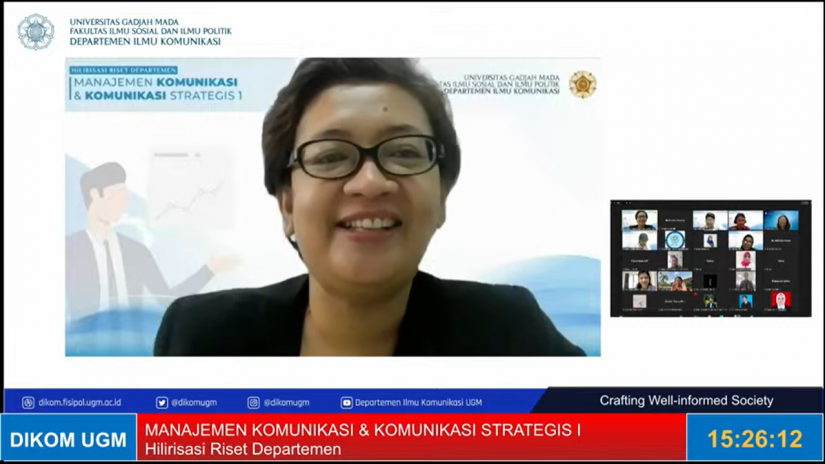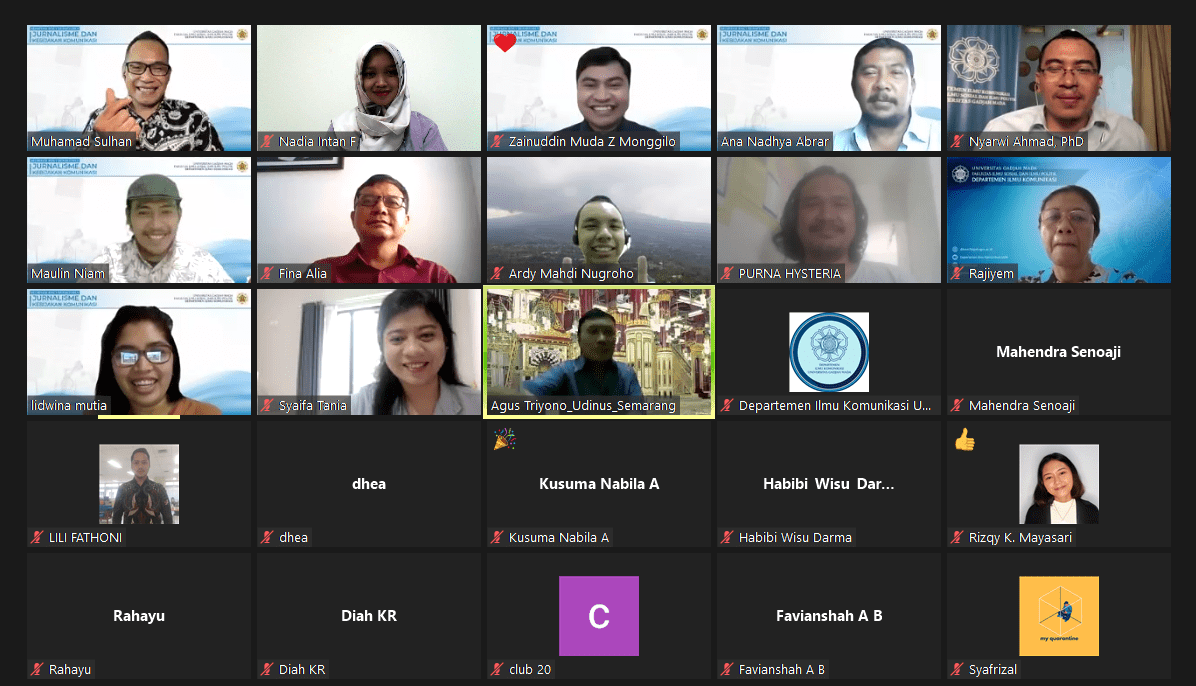
Yogyakarta, December 9th 2021─The Department of Communication Studies (Dikom) of Faculty of Social and Political Sciences of Universitas Gadjah Mada held a Department Research Downstream forum to convey the research results of lecturers together with undergraduate and postgraduate students of the Department of Communication Studies of FISIPOL UGM to the wider community.
The forum is divided into two sessions. The first session carried the theme “Journalism and Communication Policy”, while the second session discussed the theme “Communication Management and Strategic Communication”. In the first session, which was led by a Lecturer of the Department of Communication Studies, Muhammad Sulhan, there were four speakers who presented their research material.
First, Ana Nadhya Abrar explained her research with the students of the Magister of the Department of Communication Studies about the position of content creators in the media of Tribun Jogja as an entry point to seek answers to broader questions, which was about the crisis of journalism in Indonesia.
“There are three indicators of a journalism crisis, namely people have doubts about the professionalism of journalists, reduced journalist autonomy, and decreased media credibility,” the senior lecturer of the Department of Communication Studies explained.
Second, Zainuddin Muda Z. Monggilo shared the results of his research on fact-checking practices in a number of media in Indonesia. According to the journalism lecturer who is familiarly called Zam, fact checking is a crucial thing in journalism amidst the abundance of information on social media today. He also found that the majority of hoax news today are about politics and health.
“The public can take part in suppressing hoaxes, by spreading correct information (debunking) or refraining from immediately spreading information that has not been confirmed,” Zam said in a forum attended by 45 participants through the Zoom Meeting.
Third, Nyarwi Ahmad conveyed the findings of his research on public perceptions regarding the capabilities of the President of the Republic of Indonesia. The research on presidential power and resilient leaders in dealing with the COVID-19 pandemic found that there were differences in public perceptions based on several indicators, such as economic income and the preferences of the mass media as information references.
“It turns out that the polarization of society after the presidential election is also still influencing people’s mindsets regarding the current president’s performance,” the lecturer who is an expert on political communication said.
Fourth, Gilang Desti Parahita explained her research findings with the international program students of the Department of Communication Studies regarding the model of journalism and media business in 26 digital media. Based on this research, Gilang gets an idea that a number of digital media in Indonesia still rely on websites to distribute content.
“The implication is that they still display advertising content on websites, while social media is not really a space to explore new sources of income,” the journalism lecturer of the Department of Communication Studies said.

Furthermore, a senior lecturer of the Department of Communication Studies, Rahayu, guided the second session which was attended by more than 30 people through Zoom Meeting. The two presenters in this session were I Gusti Ngurah Putra and Adam W. Sukarno.
Ngurah conducts research on public relations learning materials in Indonesia. He researched eight introductory public relations books by Indonesian authors. Of the eight books, only four books discuss digital public relations (PR).
“Qualitatively, not all books discuss digital PR adequately, in the sense of comprehensively defining digital PR,” the public relations lecturer at the Department of Communication Studies said.
Then, Adam conveyed his research findings on the adoption of innovation in public education bodies, to find out innovation and adoption of internet technology by public relations. Based on this research, Adam found that there are already many applications used by government public relations but the coordination is still long and has not been trimmed.
“The innovation has not succeeded in forming an organizational simplification which in theory can be done,” Adam explained.
This forum was also broadcast through the YouTube channel of the DIKOM UGM which can still be watched again through the links for session 1 (https://www.youtube.com/watch?v=sRIwWvrqX28&t=996s ) and session 2 (https://www.youtube.com/watch?v=7gPrTjNw2Is ).
